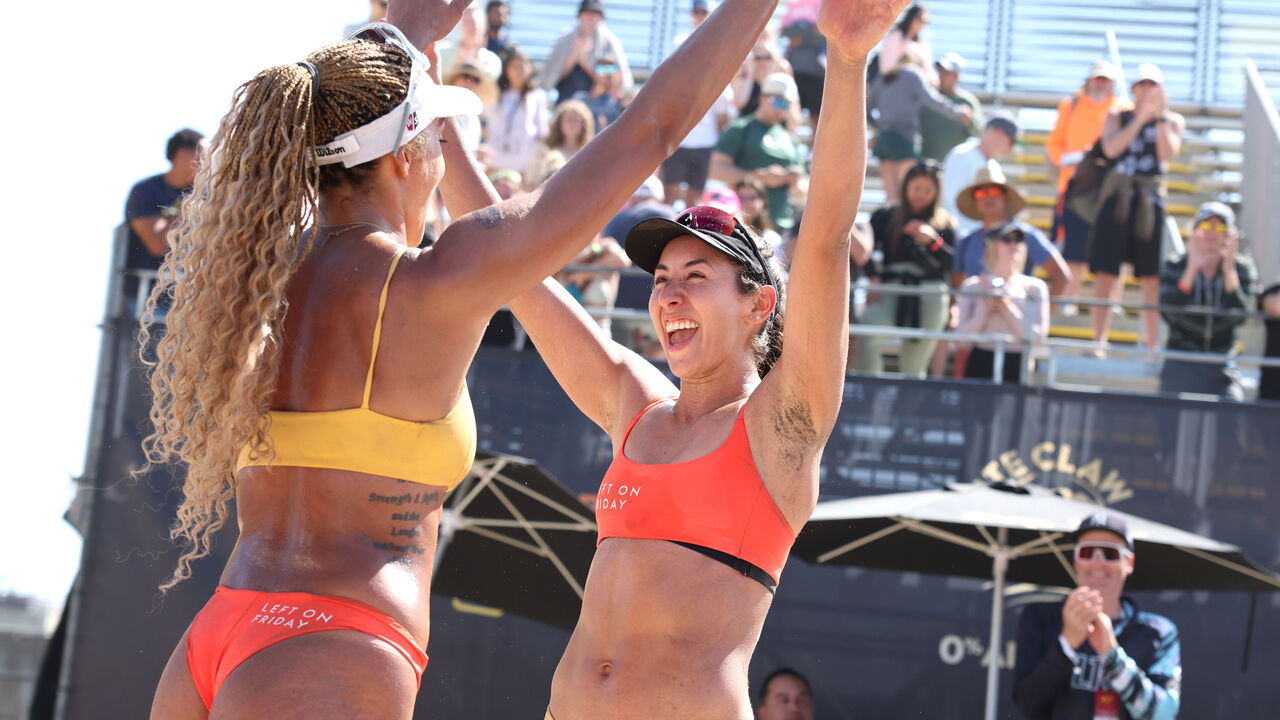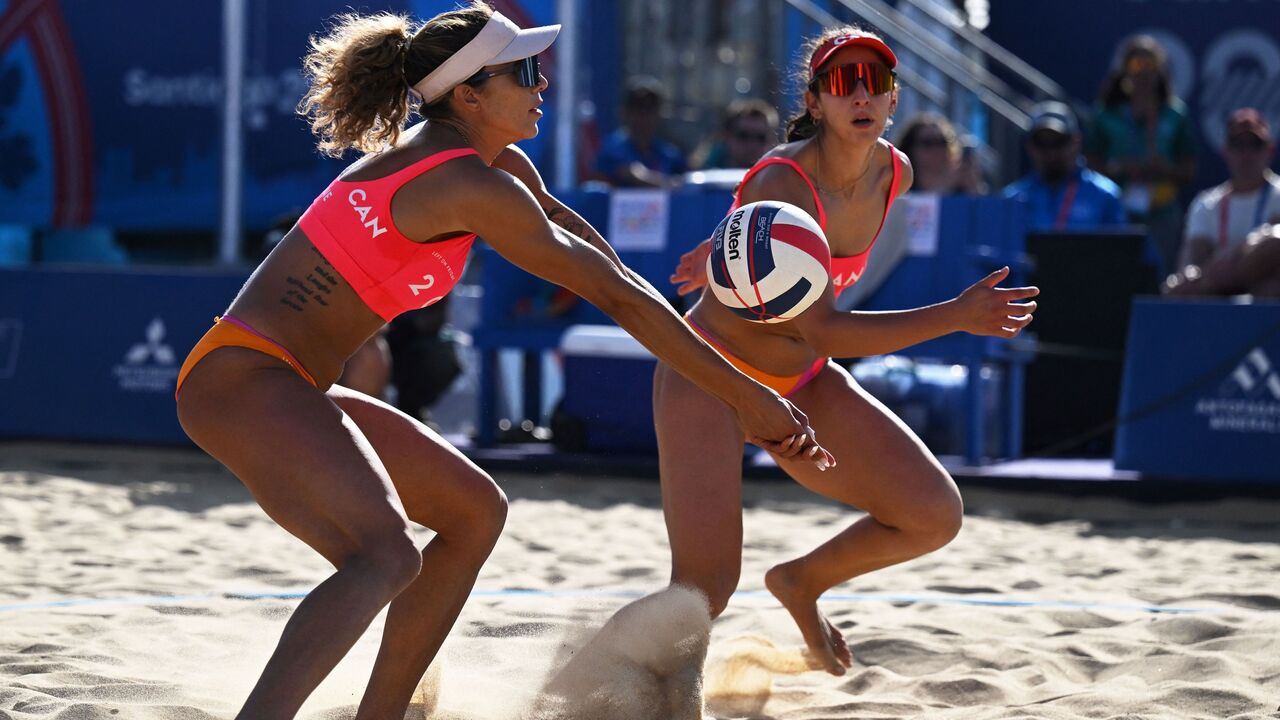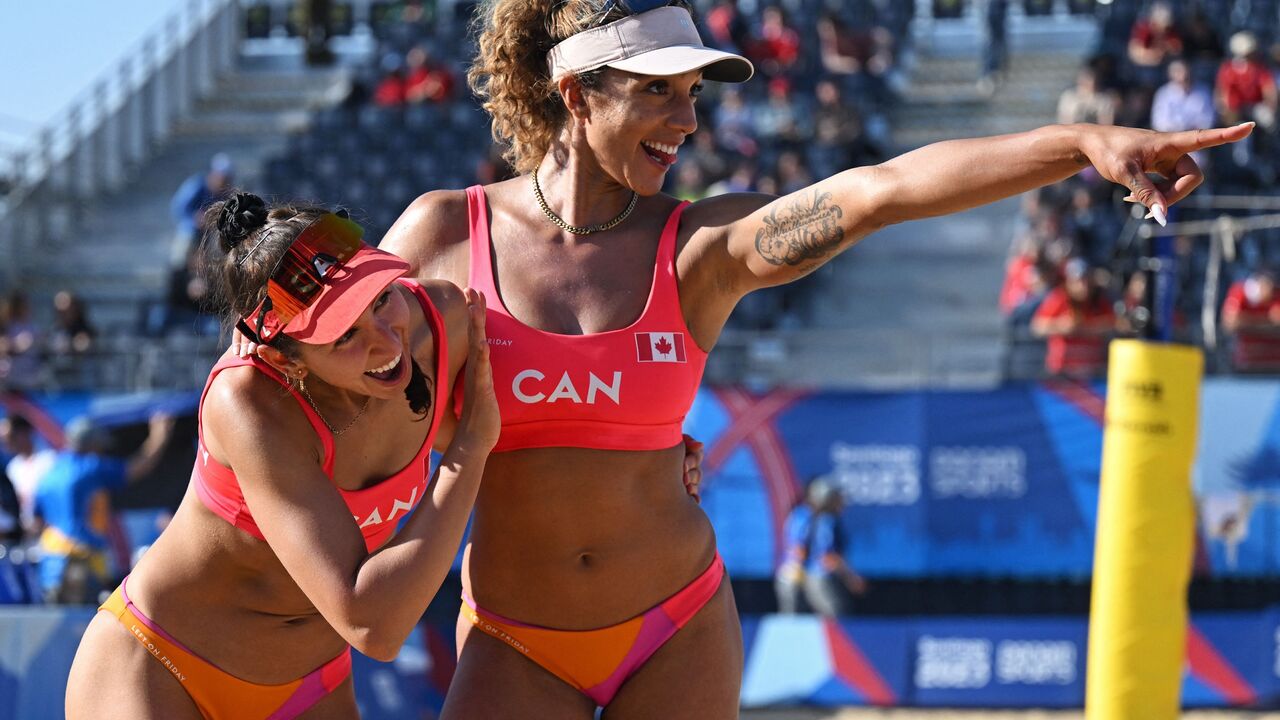Beach volleyball medal hopefuls banking on sport's momentum
At the Summer Games, classic races like the 100m sprint or the finals in soccer and basketball are surefire hits with audiences, but every four years the Olympics serve another purpose - introducing a mass of viewers to niche sports they've forgotten about.
Beach volleyball is one of those.
"Every Olympic Games, beach volleyball is one of the hottest sports - always in the best venues, best locations, the stadium is always sold out. Everyone wants to go see beach volleyball," said Melissa Humana-Paredes, who is representing Canada with her partner, Brandie Wilkerson, in France.
Paris will up the wow factor by staging beach volleyball in a temporary stadium at the foot of the Eiffel Tower. It's the second Olympics for both players, although they were partnered with other people in Tokyo. Together, they'll look to advance past the quarterfinals they each reached in 2021.
As a duo, they arrive in Paris as the No. 3-ranked team in the world behind Eduarda Santos Lisboa and Ana Patricia Ramos of Brazil, and Americans Kristen Nuss and Taryn Kloth.
Humana-Paredes and Wilkerson are hoping a deep run will help beach volleyball get more than just two weeks in the Canadian spotlight.
"It's always encouraging to see the attraction of it at the Olympics. I will say that same kind of energy does not translate for the next three years until the next Olympic Games," Humana-Paredes said. "I have been fairly disheartened or surprised at the slow growth of the sport because we all see its tremendous potential to be able to thrive. It's such a marketable sport, it's so much fun, it's great to get your young kids in. It's one of the few professional sports that has equal pay for men and women. That alone should really kind of just like set it off on its own trajectory."
With indoor volleyball experiencing unprecedented attention, perhaps, with enough momentum, beach could one day make the jump from niche sport to the pantheon of marquee Olympic events.
theScore caught up with Humana-Paredes and Wilkerson ahead of their trip to Paris to talk about the development of beach volleyball.
This interview has been edited for length and clarity.
theScore: With the increased attention on indoor volleyball and the momentum of the Olympics, do you think beach volleyball is close to having its own moment?
Wilkerson: Beach volleyball in North America is absolutely having a moment. In general, there is a lot of strong energy in terms of females in places that they weren't before and breaking a lot of barriers. So, I think beach volleyball has caught on to that too because of the opportunity and the equal pay and all of these other things that the sport has historically been. So I'm excited for beach volleyball, I think it is having a really great moment right now.

What do you think has been preventing beach volleyball from building more momentum between each Summer Games?
Wilkerson: People want to have access to watching it more regularly, whether that's access to either attending events or just more information. Once people do see a game, they're hooked, and then they want to keep following. But sometimes there's some barriers to entry in terms of understanding how to follow and what terms mean. I think if there was just a little bit of a smoother process to continuously follow these things, then I think that would change things a lot.
Humana-Paredes: Sometimes I definitely question what sports they choose to put on TV and what sports they choose not to. I don't want to call out any other sports. But sometimes I see axe-throwing on TV. And I'm like, 'This is on TV? But beach volleyball, professional women's beach volleyball, is not on TV?' Sometimes I get really upset about it because it's about the access to entry, both as a fan and as a player. I think we need to be able to have it be more visible. I think there's just a barrier of knowledge of the sport.
When people see it, of course, they're hooked. Because it is such a great game. I think there just needs to be a way to be able to have more eyes on it, have it on TV.
What are some barriers to entry that you think the sport has to overcome to attract larger audiences?
Wilkerson: It's so great that the younger generation is getting really excited, and really involved. But we can't deny that there's a level of privilege to play the sport. You need to have access to a beach and to have coaches who understand the game. And, weather is a big thing. So not every place in the world can you play the sport as easily as maybe you can play soccer or basketball, where you need very minimal equipment or technique even sometimes just to get started.
So I can understand that it does make it a bit more niche, because it's such a technical sport, and it is kind of something you need to know somebody who is at least part of it. With the lack of representation visually, even just to be able to watch and teach yourself, it's not really helping people to kind of self-start and to get involved in a sport that maybe they wouldn't typically see.
But with the growing excitement, and hopefully, as it keeps being a popular sport in the Olympics, and having nations like Canada that you wouldn't typically think of beach volleyball nations, hopefully that'll open up some other communities or other types of stories to enter this sport. Then you'll see way more growth instead of kind of feeding into just volleyball people. We want non-volleyball people to be excited about this. I think there's room for everybody.

How important are new sponsors, ones who aren't endemic to the sport, in increasing its popularity?
Wilkerson: Sponsors are extremely vital to athletes, especially in beach volleyball. I think there's a long history of individuals and teams being sponsored by all different types of brands like energy drinks, cars, equipment, lotions, and all sorts of stuff. The opportunity to insert more alternative, or creative, sponsors are there.
Income-wise, it's something that we need to support our journey. Beach volleyball is not the most affordable sport. You really have to put in a bit of an investment. As you travel the world, there are so many factors in order to show up on the court and not think about finances and coaches and fees and all these other things. So, sponsors are huge. I think beach volleyball being these individuals telling their stories has such a unique opportunity for more sponsors.
Is increased corporate interest key to developing the sport over the coming years?
Humana-Paredes: I think having the belief and the support of a sponsor is so important. For example, our campaign with Team Sobeys is so important because not only do they believe in us, in our stories, and who we are as people, but they also believe in our sport. We can feel the love and the belief in us and what that does for visibility in our sport. Being part of their Olympic campaign does a huge amount for our sport and for the growth of our sport, whether or not Sobeys realizes it.
Those brands that choose to invest in us, they're also investing in the sport. We're eternally grateful for that because to have our branding kind of in grocery stores across Canada is incredible for our sport. That's a piece of the visibility that we're talking about.

What are your hopes for beach volleyball as a result of the Paris Games?
Humana-Paredes: Beach volleyball is always on in prime time during the Olympics, and then does kind of taper off. So I'm really optimistic that after Paris, there'll be a change in that heading into the L.A. Games. … They're a beach volleyball-loving city. I feel like that will really gain a lot of momentum for the sport as well. But I think there's still a lot of work that needs to be done in the sport between now and then.
Jolene Latimer is a feature writer at theScore.
HEADLINES
- Patriots safety Jabrill Peppers goes on trial over allegations of domestic violence
- LeBron becomes 2nd 40-year-old with triple-double, Lakers beat Wizards
- 'Cheese on the ice': Thompson overcomes tossed nachos in victory
- Jokic records 19th triple-double of season, Nuggets blast 76ers
- Shesterkin goes after Tkachuk during scuffle between Rangers, Senators